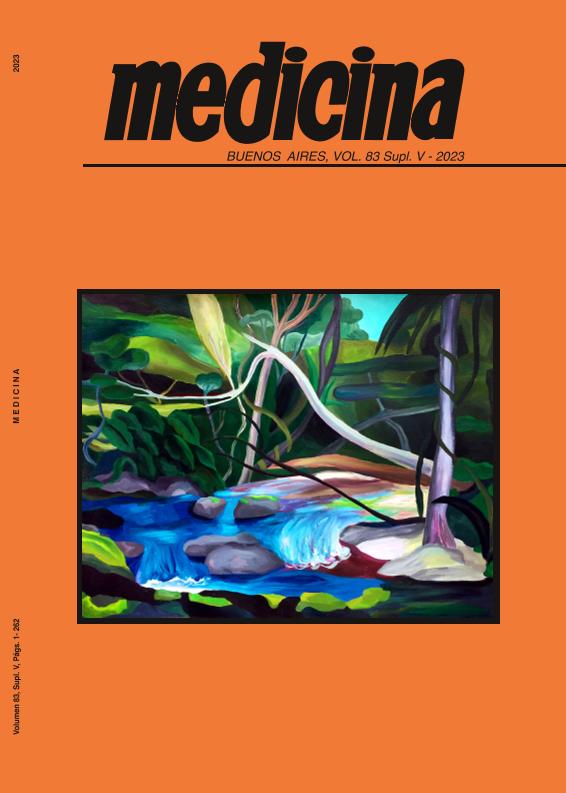Evento
Searching context-tailored strategies to enhance accessibility to colorectal cancer screening through the use of different types of evidence
Bruzzone, Ariana ; Esandi, Maria Eugenia; Schenfeld, Yamila; Dopazo Danieli, Iñaki Manuel; Bellando, María Belén; Picardi, Gonzalo; Schernenco, Joel; Robles, Manuel; Reig, Maria Ernestina
; Esandi, Maria Eugenia; Schenfeld, Yamila; Dopazo Danieli, Iñaki Manuel; Bellando, María Belén; Picardi, Gonzalo; Schernenco, Joel; Robles, Manuel; Reig, Maria Ernestina
 ; Esandi, Maria Eugenia; Schenfeld, Yamila; Dopazo Danieli, Iñaki Manuel; Bellando, María Belén; Picardi, Gonzalo; Schernenco, Joel; Robles, Manuel; Reig, Maria Ernestina
; Esandi, Maria Eugenia; Schenfeld, Yamila; Dopazo Danieli, Iñaki Manuel; Bellando, María Belén; Picardi, Gonzalo; Schernenco, Joel; Robles, Manuel; Reig, Maria Ernestina
Tipo del evento:
Reunión
Nombre del evento:
LXVIII Reunión Anual de la Sociedad Argentina de Investigación Clínica; XXV Jornadas Anuales de la Sociedad Argentina de Biología; LV Reunión Anual de la Asociación Argentina de Farmacología Experimental y VIII Reunión Científica Regional de la Asociación Argentina de Ciencia y Tecnología de Animales de Laboratorio
Fecha del evento:
15/11/2023
Institución Organizadora:
Sociedad Argentina de Investigación Clínica;
Sociedad Argentina de Biología;
Asociación Argentina de Farmacología Experimental;
Asociación Argentina de Ciencia y Tecnología de Animales de Laboratorio;
Título de la revista:
Medicina (Buenos Aires)
Editorial:
Fundación Revista Medicina
ISSN:
0025-7680
e-ISSN:
1669-9106
Idioma:
Español
Clasificación temática:
Resumen
Although colorectal cancer (CRC) ranks second in both incidence and mortality, screening coverage in Argentina is very low, particularly among individuals with low socio- economic status and public health coverage. Screening programs are cost-effective and successful in reducing disease-specific mortality. However, their implementation by health systems is complex and sub-optimal, partly at- tributed to difficulties in strategies design. Using methods and tools from dissemination and implementation sci- ences would contribute to designing evidence-informed strategies tailored to the specific context of the program. Our work aimed to explore how different types of evi- dence, stakeholder involvement, and evidence-informed deliberation contribute to the design of implementation strategies that address accessibility barriers to CRC screening. The study objectives were: 1) to generate lo- cal evidence on accessibility barriers in a programmatic area of Bahía Blanca, 2) to produce empirical evidence on effective strategies for increasing users and health professional adoption and adherence to CRC screening, 3) to design implementation strategies through stake- holder involvement and deliberation, incorporating the- oretical, empirical, and experiential evidence, 4) to an- alyze how these stakeholder-driven strategies address the local barriers to CRC. This research was part of a broader project conducted by an interdisciplinary team from UNS, with the aim of bridging the knowledge-action gap on priority health issues. It consisted in a 4-stage sequential study, using a mixed-method design. 1: Barriers’ assessment through key stakeholders’ interviews based on the consolidated meta-framework of Implementation Research and Michie’s theoretical framework. 2: Sys- tematic review on the effectiveness of implementation strategies targeting to the uptake and adherence of CRC screening. 3: Evidence-informed deliberative dialogue involving key stakeholders aimed at designing contex- tualized implementation strategies. 4: Mapping exercise linking proposed strategies and barriers, considering Garbus’ accessibility dimensions (technical, economic, political or symbolic). Over 80% of the proposed strat- egies focused on the technical accessibility dimension (network organization), while the remaining strategies addressed symbolic barriers (knowledge gaps, fear, underappreciated health issue). However, no strate- gies targeted to barriers related to the political-econom- ic dimensions were proposed, despite being perceived among the most critical ones (limited videocolonoscopy access, no screening policy, fragmented health system). In low-resource contexts, it is crucial to include politi- cal-economic dimensions in the design of strategies in order to advance effective and sustainable guidelines for CRC prevention. While a participatory approach helped lay the groundwork for new strategies, it cannot formalize a screening policy in AP2 alone, as some barriers and accessibility dimensions remain unaddressed.
Palabras clave:
IMPLEMENTACION
,
TAMIZAJE
,
CANCER
,
COLORRECTAL
Archivos asociados
Licencia
Identificadores
Colecciones
Eventos(INIBIBB)
Eventos de INST.DE INVEST.BIOQUIMICAS BAHIA BLANCA (I)
Eventos de INST.DE INVEST.BIOQUIMICAS BAHIA BLANCA (I)
Citación
Searching context-tailored strategies to enhance accessibility to colorectal cancer screening through the use of different types of evidence; LXVIII Reunión Anual de la Sociedad Argentina de Investigación Clínica; XXV Jornadas Anuales de la Sociedad Argentina de Biología; LV Reunión Anual de la Asociación Argentina de Farmacología Experimental y VIII Reunión Científica Regional de la Asociación Argentina de Ciencia y Tecnología de Animales de Laboratorio; Mar del Plata; Argentina; 2023; 42-42
Compartir



